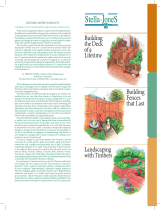Page is loading ...

3847_11/06
Safe Handling Information
Copper Azole Type B
Pressure-Treated Wood
This wood has been preserved by pressure treatment with an EPA-registered pesticide containing copper and
azole compounds to protect it from termite attack and decay. CA-B (Copper Azole Type B) preservatives penetrate
deeply into and will remain in the wood for a long period of time. However, some preservative may migrate
from the preserved wood into surrounding soil or water over time and may dislodge from the wood during construc-
tion or use upon contact with skin. The following precautions should be taken when handling the treated wood and
in determining where to use or dispose of the treated wood.
HANDLING AND USE RECOMMENDATIONS
Do not burn preserved wood (see Disposal section). Avoid prolonged inhalation of sawdust. When sawing,
sanding, or machining wood, wear a dust mask. When power-sawing and machining wood, wear goggles.
Wear gloves when working with wood. All sawdust and construction debris should be cleaned up and
disposed of after construction. After working with the wood and before eating, drinking, toileting, and use of tobacco
products, wash exposed areas thoroughly. Wash work clothes separately from other household clothing before reuse.
Preserved wood should not be used where it may come into direct or indirect contact with drinking water, except
for uses involving incidental contact such as freshwater docks and bridges. Do not use preserved wood
under circumstances where the preservative may become a component of food, animal feed, or beehives. Do not
use preserved wood for mulch. Only preserved wood that is visibly clean and free of surface residue should be
used for patios, decks, and walkways. Use hot-dip galvanized fasteners meeting ASTM-A153/A653, 304 or 316 stain-
less steel, or other fasteners and hardware as recommended by the hardware manufacturer. Do not use preserved
wood in direct contact with aluminum. Mold growth may occur on building products, including untreated or treated
wood. To remove mold from a treated wood surface, mild soap and water is typically used.
DISPOSAL RECOMMENDATIONS
CA-B products which are no longer usable, such as cutoffs, broken boards, sawdust or treated wood
material taken out of service, may be disposed of in landfills. Treated wood should not be burned in open fires or in
stoves, fireplaces, or residential boilers.
©2006 Universal Forest Products
®
, Inc. www.ufpi.com
For more information, view our website at www.postcaps.com
/




